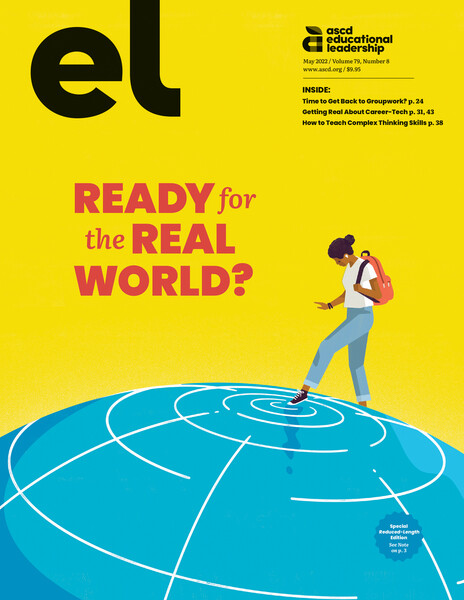April 27, 2022
•
5 min (est.)•
Vol. 79•
No. 8The Learning Zone / The Life-Changing Magic of Going In-Depth
In supporting educators' learning, resist pressure to skim the surface.

Zhu Xiao-Mei is one of my favorite classical pianists. What I love about the way she performs is that she commits to deeply understanding every piece she plays so she can uncover its fundamental beauty, then communicates that beauty so clearly that listeners are deeply moved by her playing. Her goal as an artist, she says, is to work "tirelessly, with no other goal than the truth of the music … I never force it or try to grasp its meaning too quickly. I do this until I experience love for each passage and note, until I reach a state of natural and intuitive understanding" (Zhu, 2012).
Zhu Xiao-Mei's in-depth approach stands in contrast to the way many of us operate in the modern world. We surf the web, skim books, speed date, and "like" or "block" friends with the swipe of a finger. If this tendency toward the superficial spills over into how we support children's—and adults'—learning, it can have serious consequences. If those leading PD lack a deep understanding of the strategies and ideas they share, for example, their explanations will be shallow and inadequate. Teachers won't learn what they need to, to implement strategies effectively—so students won't benefit from the changes teachers are trying to make. Everyone suffers when we stay on the surface.
We stay on the surface in learning for many reasons. Going deep may not seem like it's worth the effort, especially when we're asked to learn more strategies than anyone has time to. Often, we don't go deep because the children and adults we support have many urgent and important needs; we feel we need to learn so many things to help them that we never have the time to truly understand what we're learning. And in some settings, coaches and other educational leaders are exclusively rewarded for immediate action, leaving little time for the reflection required for deep understanding.
Some of us stay on the surface because we're drawn to new ideas before we develop an in-depth understanding of whatever it is we just recently learned. There is even a word for the tendency to be attracted to the new or novel: neophilia. Our work environments are also victims of neophilia. School leaders are often drawn to the next new thing, and educators may find themselves pushed to learn about new strategies and ideas before they've absorbed the previous new thing—then they are asked to drop that new thing when another one comes along. Management consultants call this "shiny object syndrome." Leadership changes can exacerbate this tendency.
In addition, because leaders must save time and money, they may feel they have to opt for overview workshops rather than deeper professional development, like coaching. Workshops are valuable because they can give educators an awareness of practices (I lead them all the time), but they rarely provide the deep support needed for real change in professional practice. Too often, PD is too much information, presented too superficially, when what people really need is someone who helps them implement practices in their classrooms. And when funds are limited, they shouldn't be spent on PD that doesn't lead to change.
We don't have to live on the surface. The most powerful step we can take toward deeper understanding of ideas and strategies in teaching may be to simply commit to looking deeper. Here are five strategies that can help us keep that commitment:
1. Identify priorities. The biggest barrier for individuals and organizations is trying to do so many things that nothing gets the focused attention it deserves. People need to make time to focus on what matters most for their learning. For example, I suggest coaches focus on getting comfortable with the basics and proficiently implementing a simple, three-stage coaching cycle (Knight et al., 2020)—to ensure that their coaching has an unmistakably positive impact on student learning and well-being.
2. Say no to some demands on your time. Not every "no" needs to be justified, but thanking others for inviting us to collaborate and explaining why we can't do so makes it easier for others to accept a negative response: "I'm honored you feel I have something to contribute to your committee, but I'm knee-deep in writing our instructional playbook now and need to focus my attention on that task." Saying no to your supervisor can be especially complex. I suggest coaches sit down with their supervisor with a list of tasks, asking which tasks absolutely need to be done and which are optional, and what percentage of time should be dedicated to each task. Administrators can also support deep learning by proactively ensuring that coaches have the time they need to learn what they need to learn.
3. Make it real. Coaches can deepen their knowledge of strategies by creating "instructional playbooks" of 15–20 of the highest-impact teaching strategies they share with teachers, including a one-page summary and checklist for each strategy. They can encourage teachers to deepen their knowledge by experimenting with these strategies in real-life situations (Knight et al., 2020).
4. Adopt a learner's mindset. We must ensure that our preconceptions—and sense of our own expertise—don't interfere with our learning. I suggest we adopt a learner's mindset, setting aside our preconceived notions and felt truths, to open ourselves to what others are willing to teach us. Sōtō Zen monk Shunryū Suzuki's description of a "beginner's mind" comes close to describing what I mean. He writes, "In the beginner's mind, there are many possibilities; in the expert's mind there are few" (Suzuki, 2020).
5. Be courageous. A final barrier to going deep may be doubt about our own abilities. Researchers in psychology have pointed to imposter syndrome, a tendency to doubt our abilities and feel we don't deserve our accomplishments. If we feel like imposters, we may resist asking questions and seeking help from mentors for fear of being exposed. However, the best way to ensure that we aren't imposters is to have the courage to ask questions and learn from others.
As coaches and professional developers, we may not "experience love" for each strategy and idea we share in the way Zhu Xiao-Mei experiences love for each note she plays. But deeper knowledge will lead to better PD and better teaching. Real learning only comes from real depth.
References
•
Knight, J., Hoffman, A., Harris, M., & Thomas, S. (2020). The instructional playbook: The missing link for translating research into practice. One Fine Bird Press/ASCD.
•
Suzuki, S. (2020). Zen mind, beginner's mind: Informal talks on Zen meditation and practice: 50th anniversary edition. Shambhala Publications.
•
Zhu, X. M. (2012). The secret piano: From Mao's labor camps to Bach's Goldberg Variations. Amazon Crossing.






